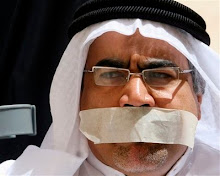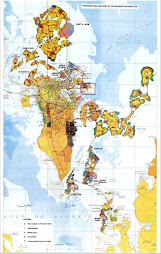Loyal Activists
Abduljalil Alsingace
15 November 2007
15 November 2007
Amidst preparation for the UN universal periodic review (UPR[1]) which is to be carried out for Bahrain next April[2], the Government of Bahrain declared last Sunday to introduce a Human Rights Commission to be headed by a post of a minister. The commission is responsible for responding to the enquiries set forth by the UN OHCHR experts on Bahrain Human rights record, as well as interact with UN Human Rights bodies to explain and clear Bahrain stance with regards to its violations to many of the acceded covenants and ratified treaties.
A row over the establishment of "Human Rights Commission-HRC" according to Paris Declaration for the formation of civic human rights organization, but more seriously to HRC being Governmental, in its formation, members selection and tasks. As for the formation and task, it would not be allowed, what ever said about its independence, to cruise away from he Authorities plans and objectives. This is secured through the decree of formation, its financial funding as well as its selected members, which should meet the satisfaction and consent of the Bahrain premiere, as stated by the Foreign Ministry[3].
As for its advocates, Faisal Folath (Folad), the Royal appointed Shura member for over three terms, was seen to be declaring the progress and some "media" details about HRC. The Authorities established BHRW[4] after dissolving the "notorious" Bahrain Center of Human Rights (BCHR) in September 2004[5]. Folath is the regional director as well as the manger of the London-office of BHRW. He is a recipient of monthly allowance, as shown and m
Folath affirmed these assertions when he stated today in Alayam newspaper that "I do not want to enter in the commission as I am a man of no "consensus" to others"[9].
Another striking piece in today's outing, is his statement that he and the group in his society –BHRW- are considering not to accept the appointment of any of its members when selected for membership in the commission, in the event selection of choosing Hassan Moussa for the presidency. He attributed the refusal of Moussa' nomination that "he is a diplomat having governmental affiliation. The HRC must be headed by an independent human rights activist". Hassan Moussa, resigned from the Bahrain Center for Human Rights and is currently working as a diplomat in Bahrain Embassy in London[10].
This piece of news about Moussa was alarming to me, as it rang a bill of what an officer in the OHCHR in Geneva was asking a Bahraini delegation about him. He, the officer, said that he found Moussa's attitude weird and could not correlate his identity he presents as being a member of OMCT, well-known organization based in Geneva, and his "intelligent" questions to the officer.

I made a little search in the library of the UN OHCHR to find that Mr Moussa was a member of the Bahraini official delegations[11], acting as an advisor, defending the position of the Authorities with regards to discussion of the reports of the CERD (Convention on Elimination of Racial Discrimination in March 2005[12] and CAT (Committee Against Torture) in May 2005[13].
These two gentlemen could be activists, but definitely loyal, for an agenda laid down by the Bahraini Authorities, as exemplified by the privileges and resources under their disposal. They, however, must be rewarded for showing loyalty, efforts exerted and the role they play. Being a president at the post of a minister, or just a member of the Governmental human rights Commission would the least accepted for being a loyal activist. Being loyal, do they have the choice to refuse or dispute?
[1] http://www.ohchr.org/english/bodies/hrcouncil/upr/index.htm
[2] http://www.ohchr.org/english/bodies/hrcouncil/upr/upr1stsession.pdf
[3] http://www.alayam.com/ArticleDetail.asp?CategoryId=2&ArticleId=290819
[4] http://bhrws.org/index.php?pageid=5
[5] http://www.alyaum.com/issue/article.php?IN=11430&I=212003
[6] www.bahrainrights.org/node/528
[7] http://www.aafaq.org/search_details.aspx?id_arch=129
[8] http://www.aafaq.org/search_details.aspx?id_arch=7435
[9] http://www.alayam.com/ArticleDetail.asp?CategoryId=32&ArticleId=290858
[10] http://www.alayam.com/ArticleDetail.asp?CategoryId=32&ArticleId=290858
[11] http://mail.google.com/mail/?attid=0.1&disp=inline&view=att&th=11500dce0c865309
[12] http://www.ohchr.org/english/bodies/cerd/docs/CERD67/66list-bahrain.pdf
[13] http://www.ohchr.org/english/bodies/cat/docs/bahrain.pdf







